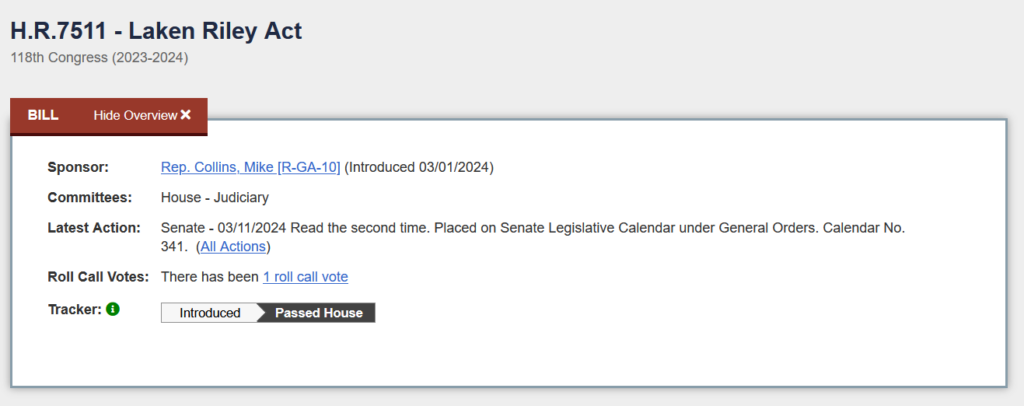Check out our Top Rewards Cards to boost your points earning and travel more!
The Laken Riley Act sailing through Congress putatively addresses one issue while sticking in other right-wing wishlist items far beyond the advertised scope. One provision, and the only one discussed in this post, is designed to severely disrupt lawful travel to the US by putting extraordinary authority in the hands of state attorneys general. Whether or not the core of the act itself has merit is beyond the scope of this post. There is no intention to minimize the death of Laken Riley. We are here solely focused on the impact to travel of one provision of the act, since that is the scope of this travel blog.
The Laken Riley Act passed the House of Representatives with bipartisan support. After feckless Senate Democrats were “unable to make significant changes to the legislation,” the bill has advanced to a vote on January 20, is expected to pass, and may be the first bill signed by the newly installed 47th President.
H.R.7511 – Laken Riley Act includes:
(c) Penalties.—Section 243 of the Immigration and Nationality Act (8 U.S.C. 1253) is amended by adding at the end the following:
“(e) Enforcement by attorney general of a State.—The attorney general of a State, or other authorized State officer, alleging a violation of the requirement to discontinue granting visas to citizens, subjects, nationals, and residents as described in subsection (d) that harms such State or its residents shall have standing to bring an action against the Secretary of State on behalf of such State or the residents of such State in an appropriate district court of the United States to obtain appropriate injunctive relief. The court shall advance on the docket and expedite the disposition of a civil action filed under this subsection to the greatest extent practicable. For purposes of this subsection, a State or its residents shall be considered to have been harmed if the State or its residents experience harm, including financial harm in excess of $100.”.
The relevant section of 8 U.S.C 1253 being amended currently is:
d) Discontinuing granting visas to nationals of country denying or delaying accepting alien
On being notified by the Attorney General that the government of a foreign country denies or unreasonably delays accepting an alien who is a citizen, subject, national, or resident of that country after the Attorney General asks whether the government will accept the alien under this section, the Secretary of State shall order consular officers in that foreign country to discontinue granting immigrant visas or nonimmigrant visas, or both, to citizens, subjects, nationals, and residents of that country until the Attorney General notifies the Secretary that the country has accepted the alien.
State Attorneys General Reign Over the Country
The Laken Riley Act will allow state attorneys general to bypass the US Attorney General to initiate legal action against the US Secretary of State to cease the issuance of visas to travelers from targeted counties.
It is crucial to point out that existing law already gives this authority to the US Attorney General, where it should rest. Giving state attorneys general the power to direcly go to the courts limits the executive branch’s ability to set visa policy on the country level and deliberately invites chaos.
All 50 state attorneys general will have this power. Any one state attorney general’s use of it will necessarily impact all 50 states. Those wielding it will forum-shop for courts and judges sympathetic to their political project. Expect Texas Attorney General Ken Paxton, himself a candidate for second place among current and recent elected officials in avoiding legal consequences for their actions, to be at the forefront.
Reciprocity for Bullies
International travel permissions are politically sensitive, subject to pride considerations, and often reciprocal. When countries add onerous requirements specific to US travelers or charge US travelers a visa fee equal to what the US charges for visas, it is out of a point of pride, not revenue generation. Not every country idly takes it from a mercurial bully.
When US courts, at the behest of state attorneys general, ban visa issuance to countries, expect some of those countries to reciprocally ban US travelers or impose other obstacles to US travelers.
Flexible, refundable travel plans will be essential as once routine travel plans enter the realm of high-stakes, chaotic political and legal action.
Ripple Effects to International Events Hosted by the US
The US is a host country for the 2026 World Cup. Los Angeles is the host city for the 2028 Summer Olympics. When those roll around how many countries will be unable to participate because of a bout of pique from one of 50 state attorneys general? Perhaps a state attorney general who wants to ‘own the libs’ by shutting down an Olympics in California?
You may want to assume that such things will all get worked out, that extra-judicial exceptions will be made since the legal system has come to be so controlled by the political party that will bring such actions. Or maybe not. The executive branch will be signing away its legal ability to resolve these matters, and will instead need to rely on persuading state attorneys general to drop legal actions in such cases. Do not expect travel business as usual.
Check Out Our: Top Rewards Cards ¦ Newsletter ¦ Twitter ¦ Facebook ¦ Instagram


Stefan – “When US courts, at the behest of state attorneys general, ban visa issuance to countries” should read “When US courts, at the behest of state attorneys general, ban visa issuance to countries which denies or unreasonably delays accepting an alien who is a citizen, subject, national, or resident of that country after the Attorney General asks whether the government will accept the alien”
Your personal narrative omits this requirement. Yes you posted the text of the law, for us to read and decipher, but your narrative of it is missing key context.
The 47th president won on election night and was not installed. That would be the 46th president and a myriad of other dems that won weeks after election day.
Countries that ignore our laws should not be allowed access to our country. The libs owned themselves when they allowed the killing of this young women by not deporting criminal aliens. If they did the number 1 thing that a government is supposed to do, which is to protect their citizens, there would have never been a Laken Riley act.
File this one under unintended consequences of unchecked mass illegal immigration including people who murder 20 year old girls out on a run. Sorry bud.
Don’t panic it will all work out. Also, I doubt California will ban illegal aliens from participating in the Olympics.
Enough of the liberal pearl clutching
Read it again
If the US deports an illegal back to the illegal’s country of origin and that country refuses to take that illegal alien back, the remedy for such action could possibly be the revocation of visas from that country
Sounds pretty reasonable to me considering that over the last 4 years millions of illegals made their way over the border and/or overstayed visas – sayonara – time to go home
Yeah it’s pretty cut and dry. It’s a way to make sure that we deport illegal aliens back to their home country and the home country won’t turn them down. Will also have the intended affect of making sure these countries keep them from ever making it to the US as they will also maintain their borders from neighboring countries instead of the current red carpet to the US to deal with them. It’s kind of brilliant honestly.
You are completely missing the point.
Stefan is pointing out that the bill gives ANY state attorney general power over the country’s Secretary of State.
And if the U.S. Attorney General, in her sole discretion, thinks another country is being uncooperative about taking a single deportee, U.S. officials must immediately halt granting all visas for every person in that country. And a quite possible effect is that in retaliation U.S. citizens will be barred from that country.
Basically this is about states being able to sue to Secretary of State for giving visas to violent criminals. If this impedes conferences with violent criminals that is the purpose.